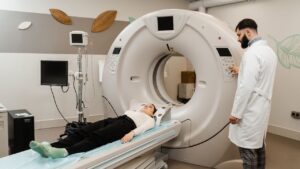
After a serious car accident, early diagnosis of any traumatic brain injury (TBI) is key to successful and complete recovery. But Traumatic Brain Injury Diagnosis can be difficult, and some emergency room doctors will miss it. In other cases, the symptoms of traumatic brain injury won’t even be apparent until after you leave the hospital.
Diagnosing Traumatic Brain Injury
Any time a person loses consciousness in an auto accident, there is a good chance that there has been some level of traumatic brain injury. While in the hospital, you will likely undergo MRI and CT scans to determine any injuries to your brain. However, many traumatic brain injuries cause “micro-damage” that goes unseen in a traditional brain scan. Instead, TBI specialists may order diffusion tensor imaging to measure the amount of fluid in the brain and detect areas where flow is disrupted. TBI Testing is an essential part of Diagnosing Traumatic Brain Injury.
Sometimes a traumatic brain injury will go undetected at first. In those cases it will be especially important for family and supporters of an injured motorist to keep an eye out for TBI symptoms, like:
- Headaches
- Amnesia or memory loss
- Nausea
- Vomiting
- Dizziness
- Loss of sense of taste or smell
- Ringing of the ears
- Short term memory interruption; or
- Temporary loss of cognitive skills.
If you begin experience any of these symptoms, you should tell your doctor immediately. He or she should refer you to a TBI specialist who can help confirm a traumatic brain injury diagnosis.
Detecting the injury is only the first step. Once you have been diagnosed with a traumatic brain injury, you may need to go through a neurophysiological assessment to measure your abilities of language, movement, memory, IQ, and sense of taste or smell. These tests can help your doctors assess the damage and its effects, as well as create a treatment plan.
Treatment for Traumatic Brain Injury
No two people have the same traumatic brain injury. Even damage to the same parts of the brain can cause different injuries with different symptoms and different treatment needs. After your doctors review the neurophysiological assessment, they will prepare a treatment plan based on your individual needs and abilities. A treatment plan could involve:
- Medication
- Replacement hormones
- Psychological counseling
- Physical therapy
- Occupational therapy or retraining
- Speech therapy
- Medical devices
Once the plan is in place, your primary care physician, or possibly your neurologist, will assemble a team of professionals to help you toward recovery.
The length of treatment in a TBI can can vary as much as its symptoms. For some minor concussions, the symptoms could resolve quickly. Treatment for severe traumatic brain injury, though, can take years. Some TBI patients will have ongoing symptoms for their injury for the rest of their lives. In those cases, it is important that patients continue to receive ongoing care to ensure they do not lose capacity or regress in their treatments.
The traumatic brain injury (TBI) lawyers in Michigan at Christensen Law give special attention to traumatic brain injury diagnosis and treatment. They understand the process and the importance of receiving full medical benefits for treatments.






